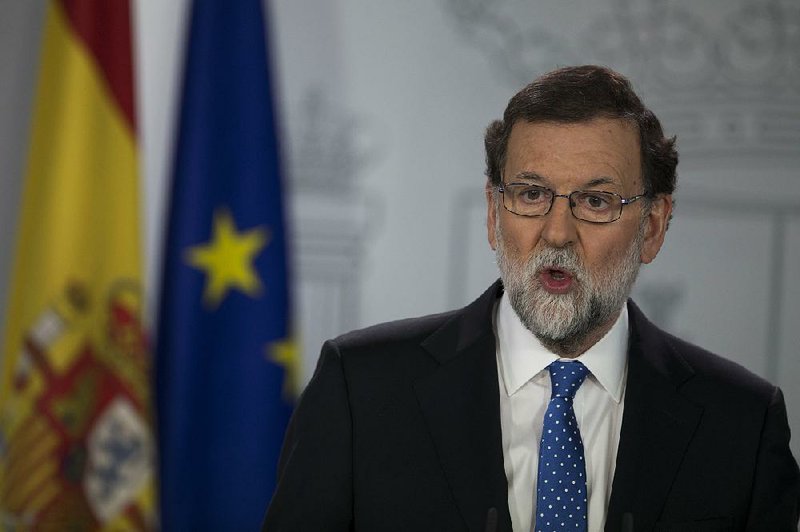BARCELONA, Spain -- Spain's political crisis showed few signs of abating Friday after Catalan separatist parties clinched a parliamentary majority in an exceptional election called by the country's prime minister, who remained steadfast in his refusal to consider independence for the region.
The outcome of Thursday's election, in which an anti-secession party also made its best showing to date, did yield a sign of possible movement: Prime Minister Mariano Rajoy and the pro-independence regional president he removed from office said they were ready to talk.
However, the two men made clear they were working off different sets of presumptions for a potential dialogue.
Speaking from Brussels, where he fled nearly eight weeks ago to avoid being arrested on possible rebellion and sedition charges, ex-Catalan President Carles Puigdemont said he would talk with Rajoy under one condition -- their meeting would have to be outside Spain.
Even with Puigdemont campaigning from Belgium, his Together for Catalonia party snared 34 of the regional parliament's 135 seats, making it the most popular separatist party.
As the leading separatist candidate, Puigdemont could try to become president of Catalonia again. The new parliament would not be able to elect him for the post unless he returns to Barcelona, the regional capital, but he is likely to be arrested when he turns up on Spanish soil.
The election results nonetheless strengthened Puigdemont's hand, as separatist politicians won 70 of the parliament seats altogether. Rajoy's conservative Popular Party secured just three seats, despite the prime minister's efforts to put down the Catalan independence movement.
"More than 2 million people are in favor of Catalonia's independence," Puigdemont said, referring to the election results. "Recognizing reality is vital if we are to find a solution."
Rajoy ignored his adversary's appeal for a meeting, declaring instead that the election results show a "new era based on dialogue" was beginning in Catalonia. He also set out a condition of his own for any talks: separatist officeholders must abide by the Spanish Constitution, which says the country is "indivisible."
"I will make an effort to dialogue with the government that forms in Catalonia, but I expect it to stop acting unilaterally and outside the law," Rajoy said during a media briefing.
People walking by the sea in Barcelona said they wanted the leaders to settle their differences through negotiation.
Product manager Beatriz Versosa, 33, said "the rulers of Spain and Catalonia [must] put themselves in the place of citizens and understand that they must solve the issue and set aside the most extreme positions."
Mercedes Aras, meanwhile, wanted Spanish authorities to "sit down to negotiate on a realistic basis."
Negotiations in the past involved a compromise of granting Catalonia more self-government rights, but separatists are likely to use their regained majority to push for a binding referendum on secession.
Rajoy, invoking constitutional authority to temporarily take over a region's affairs, fired the Catalan government that Puigdemont led and dissolved the regional parliament after separatist lawmakers declared Catalonia's independence in October. They based the declaration on results from a voter referendum that Spanish courts ruled was illegal.
The prime minister also called the election held Thursday. With statistics showing the region's moves toward independence hurting the Catalan economy, Rajoy hoped the vote would sideline the separatist movement.
The pro-Spain party called Citizens collected the most votes of any single party and its biggest electoral triumph since its founding just over 10 years ago. But the business-friendly party's 37 seats aren't enough for it to form a regional government on its own.
The parties that favor an independent Catalonia did better than polls had predicted. Along with the 34 seats won by Puigdemont's party, its main separatist rival, the left-wing Republican Left of Catalonia party, collected 32 seats.
Republican Left leader Oriol Junqueras -- Puigdemont's No. 2 in the previous Catalan government -- is jailed near Madrid while an investigation into possible sedition and rebellion by the separatist leaders continues. The radical, anti-capitalist Popular Unity Candidacy party won four seats.
The separatist parties' history of squabbling won't make it easy for them to put together a Cabinet.
Fernando Vallespin, a professor of political studies at Madrid's Autonomous University, said multiple unresolved issues cloud the immediate future of Catalonia, including the legal issues and whether the pro-independence parties can find common ground.
"It really is an unknown situation," he said.
Information for this article was contributed by Lorne Cook of The Associated Press.
A Section on 12/23/2017
